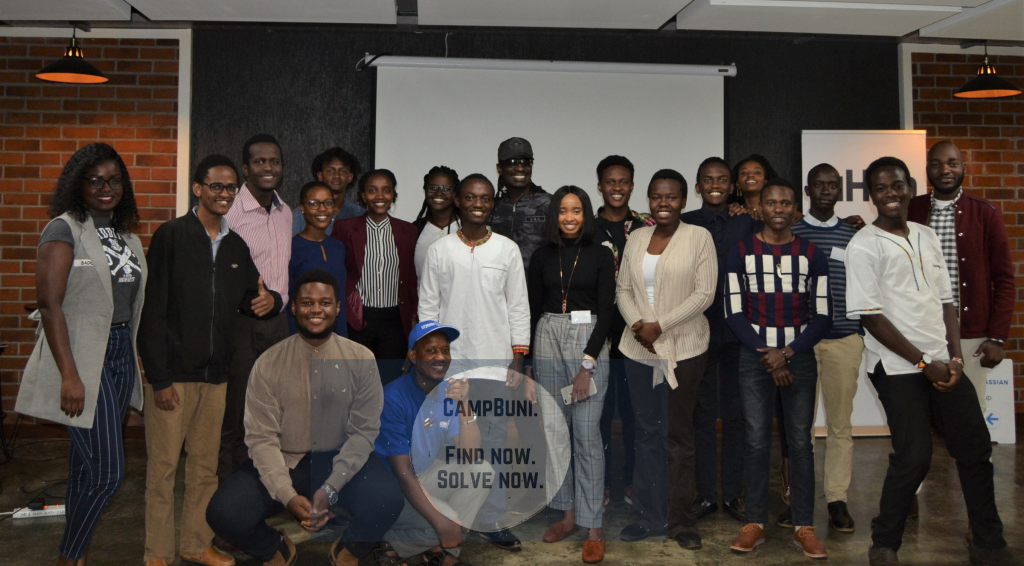
What happens when you put together creatives to innovate for their communities?
The fourth take of CampBuni’s annual 5-day camps happened with a new twist: we selected 10 participants to work with, as opposed to our previous open camps, courtesy of outreach and communications support by Facebook Africa and Gina Din Foundation, respectively. We settled on working with ages 18-23 years, contrary to our normal focus on ages 13-17 years. The results came with many important lessons for us, and I hope to share some of them here.

While at the iHub, our participants represented a variety of academic backgrounds and interests—ranging from IT to fashion design. Some were deep into their 3rd year of university while some are taking a gap year before joining college abroad. However varied their backgrounds, one similarity bound them: An unquenchable urge to use their creative interests to solve complex problems in their local communities, themselves, and countries.
Different people learn in different ways
This unexpected, yet beautiful, mix of interests and backgrounds meant that during the camp: an animator would literally sketch out his visual understanding of the sessions, during breaks a pair of golden voices would soothe our anxieties and a software junkie would mull over code. We couldn’t have asked for a better and more eccentric cohort!

Our cohort had an exciting start on Tuesday (13th August), we set a base understanding for our participants: understanding human-centered design thinking through different activities, sessions highlighting of good and bad cases of design thinking.
Circular Design is inseparable from learning
Facilitators and participants alike, the sessions were filled with energy and passion, and all that was learned, ideated or conceived was showcased on Saturday (17th August)—the final day which concluded with the certificate hand-over. All these activities carried with them one central theme—Circular Design. While we were learning to solve for problems using the participant’s creative faculties we were curious on how we would do it waste-free.

We laid a strong emphasis on experiential learning: highlighting the value in doing, failing, making and understanding our end-users deeply. This featured through intense brainstorm sessions, research sessions and famed group activities like the marshmallow and wallet challenges. “The brainstorm session was today’s highlight because it helped me think way beyond my comfort zone…”—Day 2’s anonymized feedback.
At the core of the program, we learnt the legalities around Intellectual Property (Trademarks, Copyright and Patents) courtesy of Anjarwalla and Khanna(Africa Legal Network) who were kind enough to guide us through this. “The presentation from Anjarwalla were strikingly informative. Thank you Maureen and Robert!”—Day 2’s anonymized feedback.

Thought and experiential learning rule
Our experiential learning involved learning from experienced players in the field. David Muriithi (known by his alter-ego, ‘DJ D-Lite’) led us through his personal and professional journey from auditing big companies, leading a family of outstanding creatives, nurturing talent, and his fete managing some of the best talent including our guest facilitator, Nameless! “I didn’t know I could meet a DJ at 50 and so updated with youth’s vibes.”—anonymized feedback from David’s session.


Our facilitators made huge compromises to join us, and this included Dr. Nthabiseng Moleko (A faculty from University of Stellenboch who teaches Economics and Statistics) who joined us all the way from South Africa. Most times we hear “create more” but this time it was hard data telling us us that, indeed, we need to create more.
Did you know? Africa’s contribution to the world export of cultural export goods is actually less than 1%? “Dr. Nthabseng’s session was eye-opening. She shone a light to our blind spots”—CampBuni facilitators’ remarks.

We had our last two days focused on solving, ideating, making prototypes, having fun to a point we had to chase our participants to go home lest everyone overslept from fatigue!

Demo day was a billboard day for all the work we put into the camp! We had friends, family and our supporters watch us pitch our solutions. We had five teams present on their solutions to problems they and our community face. What was most impressive was that some teams made prototypes for their solutions in just under 24 hours! Solutions pitched ranged from Transport solutions for decongesting Nairobi’s urban centers to a bold approach to solve for wildlife conservation.
Perpetual’s presentation—on repurposing every-day solid waste into fashion pieces—that began with a captivating analogy of a bird and its nestlings won the judges’ hearts and carried the day. Our runner up was a group tackling massive traffic snarl ups in Nairobi’s urban center with alternative transport solutions. Our special mention went to Celestine who—scored highest on critical thinking—is aggressively innovating to stop human-wildlife conflict.

We had a word from renown musician Nameless who emphasized on a magic trilogy for any successful streak: Passion, Discipline and Strategy. Apart from knowing the real name behind ‘Nameless’, we got to learn who the real Nameless is: where he came from, his fears and how he balances his music career and architectural career. His session was followed by a Q&A session, and later on, handed certificates to our participants, recognized our volunteers and support staff. See more photos on our Instagram page (@CampBuni).

Of course it probably didn’t happen if the pictures weren’t there.

When is CampBuni 4.0 happening? Be sure to subscribe and follow us on social media to find out!
Our team is currently working on a newer and bigger way to experience our camps. Stay tuned!
Written By: Leroy Mwasaru
Original post: https://campbuni.org/CampBuni/campbuni-our-circular-economy/
